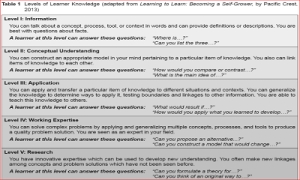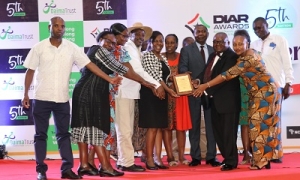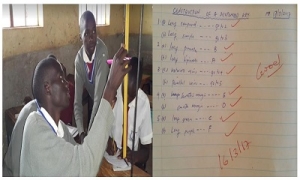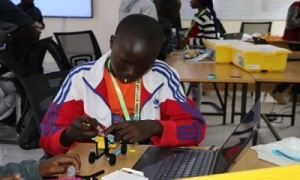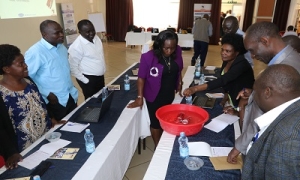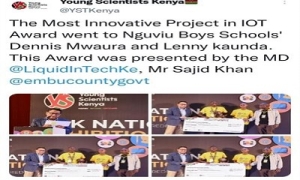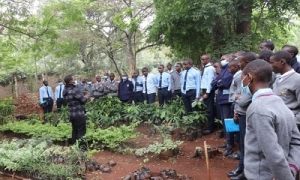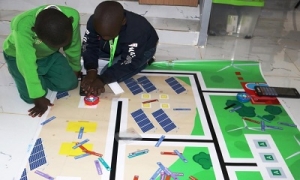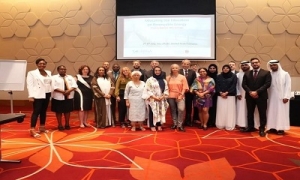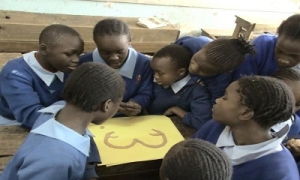Esther Nyambura
By Mungai Njoroge, PhD.
The education sector has a broad spectrum of criteria for "desired classroom teacher" This criterion is context specific and embodied through various titles and awards. In line with Sustainable Development Goal Number Four (SDG4), a desired classroom teacher ensures "inclusive and equitable quality education and promote lifelong learning opportunities for all". In Kenya, some of the titles conferred to such a teacher include the teacher of the year award (TOYA), innovative/ICT teacher of the year (iTOYA) and principal of the year (POYA).
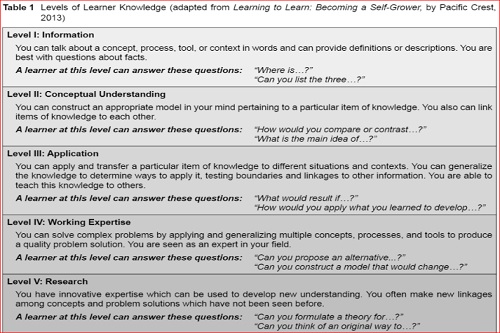
The desired teacher facilitates meaningful learning, which occurs when learners seek to relate new concepts and propositions to relevant existing concepts, and propositions in their cognitive structures and contextual experiences. The teacher encourages learners to actively engage in learning and take responsibility for their learning.
Such a teacher helps learners improve their learning skills, including those in the affective domain, such that students achieve a positive attitude toward learning concepts – irrespective of the subject, a sense of self-efficacy, the ability to manage frustration, and a willingness to take risks in learning. These desired teachers are also masters of scaffolding learning. These teachers strive to continuously improve student learning outcomes, such that learners move from the level of mere information and memorisation through conceptual understanding to application, working expertise (problem-solving), and then possibly to the highest level of creativity – as detailed by Bloom's taxonomy; that of the researcher who has "innovative expertise which can be used to develop new understanding and problem solutions" (see table)
Acknowledgement: The Ualimu Bora column has drawn some of the content (excerpts and the table) on "desired classroom teacher" from the following source:
Gathumbi, A. W., Njoroge, J. M., & Hintze, D. L. (2013). Towards Comprehensive Professional Development of Teachers: The Case of Kenya. International Journal of Process Education, 5(1), 3 – 14. Available: http://www.ijpe.online/2013/kenya.pdf
Diversity, Equity, Inclusion & Belonging
CEMASTEA emerged the winner in the category of best state agency on DEIB emerging as top employer brand during the National Diversity and Inclusion Awards & Recognition (DIAR) 5th edition. This is a testament to the hard work and dedication of CEMASTEA in creating an outstanding inclusive workplace environment.
CEMASTEA Disability Mainstreaming committee is charged with the responsibility of ensuring a friendly environment to its members and customers on issues of Special Needs.
The award was received by CEMASTEA Board Chair, Dr. Mutisya, OGW, and C.E.O Madam Jacinta Akatsa, HSC.
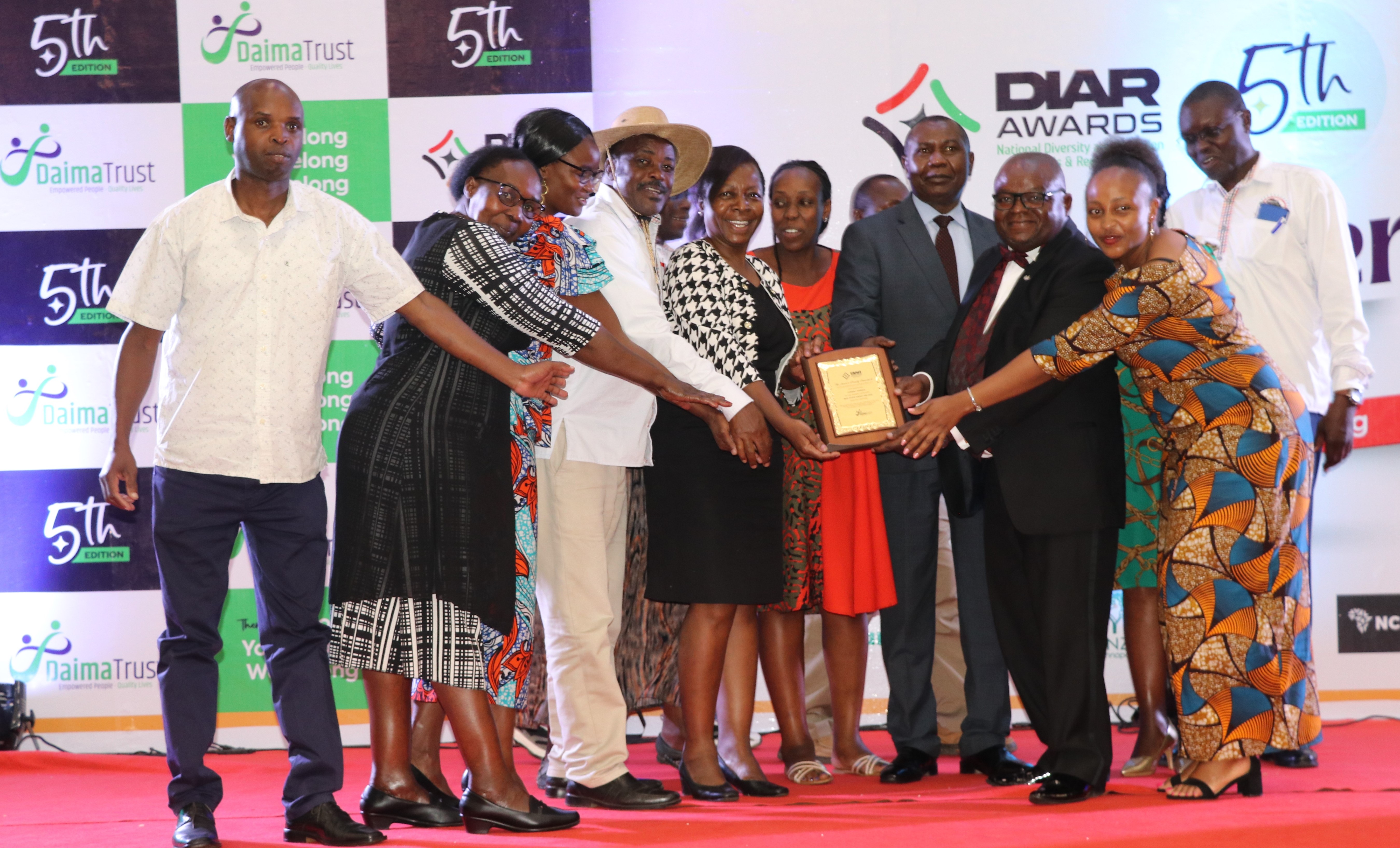
CEMASTEA Board chair Dr. Mutisya, OGW, the C.E.O CEMASTEA, Madam Akatsa, HSC and members of staff receive the award on overall winner in the category of best state agency on DEIB emerging as top employer brand during the DIAR 5th edition
By Thuo Karanja
Feedback is an essential part of science instruction. Feedback is any spoken or written response to a learner in response to their attainment levels in an assessment task, performance or product. While on most occasions, feedback is given by a teacher, learners can also give each other peer feedback. One of the most used feedback forms is grading learners' scores, marks, and grades. Such feedback is sometimes accompanied by comments such as 'good, keep it up, you need to improve, bravo, pull up your socks and see me' written on the answer scripts or in report cards. In some cases, teachers may use sarcastic, ambiguous and dismissive statements to describe attainment. Feedback is also given during the revision of assessment tasks, when teachers call up individual learners, or during academic days when parents are invited.
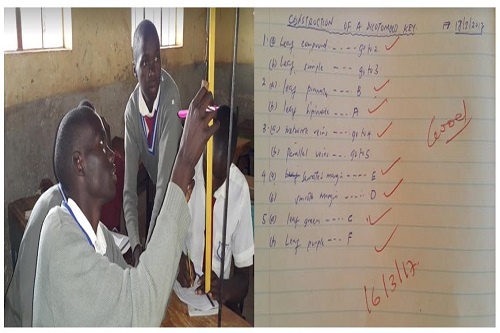
What is the role of feedback in learning? Feedback is intended to acknowledge learners' efforts and progress toward achieving the learning outcomes. Effective feedback should be constructive and point learners to ways to improve their learning and achievement. Studies have shown that most feedback given to learners is not practical or helpful in 'moving to learn forward'. Most learners claim that much of the feedback they receive is usually too late, vague, unclear and inconsistent to be beneficial. Feedback such as 'you are a great student', 'that was a clever response', 'well done', and 'very poor' focus personally on the learner and is not connected to the specifics of the learning goals and success criteria. It shows no evidence about the learning or the task. These are just general observations of success or failure and tend to attribute the success or failure to the personal aspects of the learner.
Research has repeatedly confirmed that feedback is more effective when it's comments based, specific and focuses more on the task, the subject and strategies for the learner's self-improvement/regulation. Self-regulation is essential, and learners need to be guided to utilise that feedback in identifying their strengths and weakness and where to put more effort into changing strategies for further development and learning. Feedback is considered weak and ineffective when it focuses on a learner's characteristics or is generalised vague comments and praise. For more knowledge and practice in the classroom and assessment feedback, watch a series of Vimeo videos by an expert on this subject, Dylan Wiliam, on https://vimeo.com/514647973
By Martin Mungai and Winfred Magu
CEMASTEA has been at the forefront of promoting STEM education and particularly coding and robotics. The Centre, from 13th to 16th December 2022, organised a four-day STEM Coding and Robotics Boot Camp for 2022. The coding and robotics boot camp is an educational program that offers learners a platform to learn coding and robotics skills. Overall, the camp's goal was to provide students with the knowledge and skills they need to succeed in the rapidly-evolving fields of computer science and robotics. The camp brought g together learners from pre-primary, primary and secondary schools to impart them with relevant coding and robotics skills and hands-on experience that allowed them to apply the concepts they were learning in a practical setting. The specific objectives of a coding and robotics boot camp were;
- To provide students with a strong foundation in coding and programming languages, such as Python, Java, C++, or C#.
- To teach students how to design and build robots using various hardware and software tools.
- To provide students with hands-on experience working on coding and robotics projects, such as building and programming a robotic arm or creating a simple computer game.
- To help students develop problem-solving, creativity, and critical thinking skills through designing and building robots and coding projects.
- Building a community of learners by giving learners opportunities to collaborate on projects, attend guest lectures and workshops, and connect with industry professionals.
During the camp, participants undertook intensive training where they explored Bionics, Creative coding, Robotics (A) – Tetrix, Robotics (B) – EV3 Kit, Mobile App Development, 3D and Graphics design – Fabrication and Arduino Prototyping. They developed projects to address societal problems such as mental health, gender-based violence and fire safety. The camp was highly interactive and provided them with opportunities to create, collaborate and ideate some of their projects.
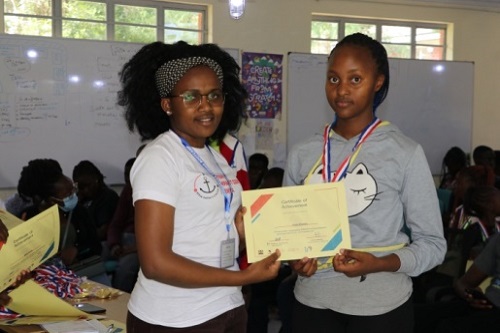
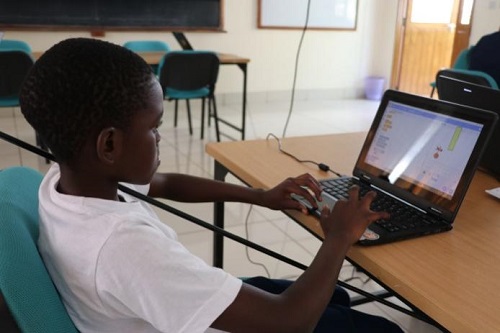
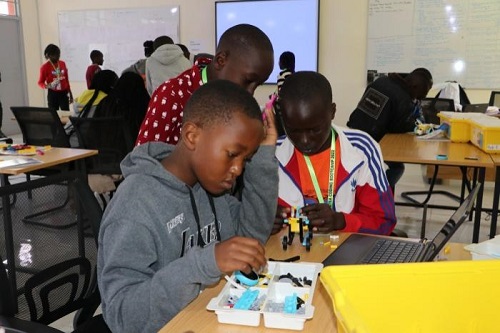
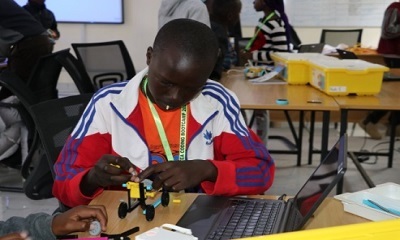
Participants engaged in various activities during the boot camp
The opening ceremony was graced by the SAP representatives, who encouraged the participants to use such initiatives by CEMASTEA to build on their skills. They were equally urged to make use of the open learning platform from the SAP website to acquire a skill through the freely offered online courses.
The Closing ceremony was presided over by the Deputy Director of CEMASTEA, Madam Lydia Muriithi. She awarded participants with certificates of achievement and medals. In her remarks, she urged tie participants to continue upgrading their skills and ensure that they build on what they learned during the four days course. She also urged them to train their peers in school so that they could also benefit from the skills acquired.
The Boot Camp was co-sponsored by CEMASTEA with various partners. This includes STEM impact Kenya, Angaza Elimu, Africa Code Week (ACW) and iStart to support the camp activities. The partners offered financial and in-kind support, including trainers. Mr Martin, the deputy coordinator of STEM programmes, chaired the organising committee for boot camp. He commended the participants for observing discipline and being innovative in their projects.
By John Makanda & Dan Orero
The Directorate of Quality Assurance and 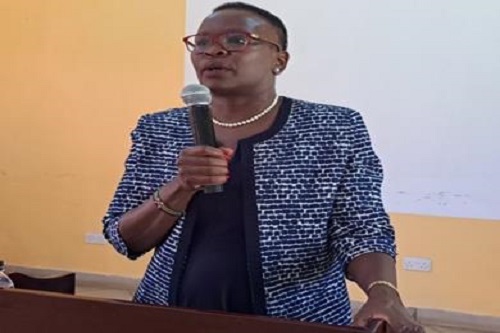 Standards (DQAS) is mandated to provide advisory services and ensure an integrated and collaborative approach to improving basic education's quality and relevance. The Directorate collaborates with all institutions, practitioners, and critical stakeholders in the education sub-sector. CEMASTEA, in collaboration with the Directorate, organised a three-day workshop for Quality Assurance and Standards Officers. The workshops held from 24th to 26th October in four venues, Kakamega, Naivasha, Embu and Machakos, had the theme of strengthening the capacity of QASO to monitor and support the implementation of CBC and STEM activities at the school level.
Standards (DQAS) is mandated to provide advisory services and ensure an integrated and collaborative approach to improving basic education's quality and relevance. The Directorate collaborates with all institutions, practitioners, and critical stakeholders in the education sub-sector. CEMASTEA, in collaboration with the Directorate, organised a three-day workshop for Quality Assurance and Standards Officers. The workshops held from 24th to 26th October in four venues, Kakamega, Naivasha, Embu and Machakos, had the theme of strengthening the capacity of QASO to monitor and support the implementation of CBC and STEM activities at the school level.
Director of Quality Assurance, Ministry of Education, Mrs Evelyne Owoko
The workshops brought together 375 officers and offered an opportunity to share experiences on implementing Competency-Based Curriculum STEM activities and supporting and monitoring SMASE activities at the County level. The workshops also aimed at equipping them with further skills for interpreting curriculum designs for effective monitoring and support at the school level.
STEM activities that promote learner-centred lessons for effective implementation of curriculum; and skills for effective monitoring and support of lesson study. While making her opening remarks to the team that converged in Kakamega, Madam Margaret Muandale, Director of Teacher Education, Ministry of Education, lauded CEMASTEA for her excellent work in enhancing the capacity of QASOs. She noted that the QASOs are essential in ensuring that education programmes are effectively implemented; they also support, mentor and coach teachers. She further advised QASOs to also pay attention to teachers' colleges for enhanced quality of teaching.
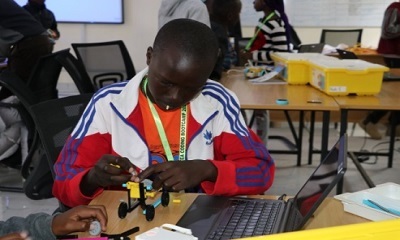
CEMASTEA has trained teachers on using learners-centred strategies such as Inquiry-Based Learning, the 5E instructional model, Lesson study and ICT integration in teaching & learning, among others. Regarding that, the QASOs need to support teachers as they implement CBC and STEM activities in schools, which will, in turn, help transform teaching and learning to achieve the 21st Century outcomes, which include digital literacy, collaboration and formation of communities of practice, among others.
The opening ceremony at Naivasha was presided over by the Director of Quality Assurance, Ministry of Education, Mrs Evelyne Owoko. The closing ceremony was presided over by the County Director for Education, Nakuru County Mr Fredrick M. Osewe.
By Mr Francis Mugendi and Ms Sophy Njoki, Nguviu Boys High School
One emphasis and challenge by CEMASTEA on STEM model schools is supporting learners to engage in innovative activities in Marker Spaces that target solutions to societal problems. Nguviu Boy's School, one of the STEM Model Schools in Kenya, has embraced the MakerSpace Concept. As part of the team of teachers trained by CEMASTEA on STEM Education, we, Mr Francis Mugendi and Ms Sophy Njoki encourage and work with students in the Marker Space at the school. We challenge students to think of innovative ways to develop solutions to everyday problems. We posed the problem of quelea birds that threaten the enhancement of food security in the country. The quelea birds are a menace to farms where rice, millet, sorghum, wheat, sunflower and strawberries are.
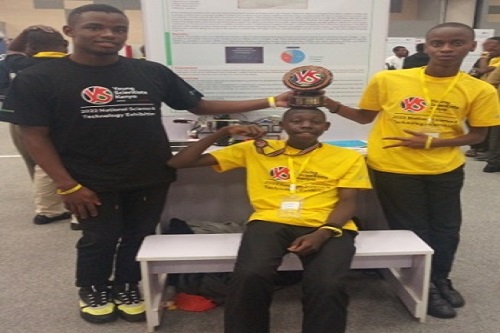
Lenny Kaunda and Dennis Mwaura posing with the IOT award
Rice farmers in Mwea region have encountered huge losses severally following the destruction of thousands of acres of plantation by these birds. Farmers are forced to spend more time in the rice plantations chasing the birds away, which in most cases, outwit them due to their large numbers. The hide-and-seek game between farmers and the birds is not a productive venture, as it wastes time for farmers. When birds outwit farmers, it severely threatens food security and increases farmers' poverty index. Two of our students, Lenny Kaunda and Dennis Mwaura, took up the challenge. Working in the Makers Space, the two students developed an innovation, "Farm LEMWA Model 1", as an intervention to the menace of the quelea birds.
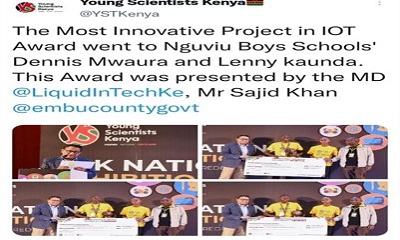
Presentation of award to Nguviu Boy's School. Proto-type of "Farm LEMWA Model 1"
The "Farm LEMWA Model 1" proto-type device designed and developed by the two students primarily uses robotic kits and laptops donated to Nguviu Boy's School by CEMASTEA as part of infrastructure support to STEM Model Schools. "Farm LEMWA Model 1" device consists of three major components; a central system, a radar sensor, and a power bank. Cognizant of the need to embrace green energy, the power bank has a provision to tap into solar energy. A backup battery to store the power generated during the day is part of the design to ensure the device is useful also at night. The excess stored energy can be used to do other functions like charging phones and torches and lighting up the farm to enhance security. Surveillance cameras linked with the owner are fitted to the device to ensure its safety. The ultrasonic sensors detect incoming birds from all directions. Once detected, a signal is sent to activate the high-pitched speaker, distracting the birds. Several sounds can be installed to outsmart the bird to avoid the monotony of sounds. Mr Mugendi, the lead mentor in the Maker Space, with the support of the school's Chief Principal and Patron of the Maker Space, Mr Paul Mwangele, guided the two students in enrolling the project in this year's 5th Young Scientist Kenya competitions. During the competition held at Sarit Centre Expo in Nairobi, Kenya, Farm LEMWA Model 1 emerged as the best in the Most Innovative Project in the Internet of Things (IoT) category. The Chief Principal thanked CEMASTEA for the continued support of STEM Model Schools.
Kindly give us your feedback using the link https://forms.gle/S2DPjwEBRNrdL4bt7
By Winfred Magu and Patrick Wanjohi
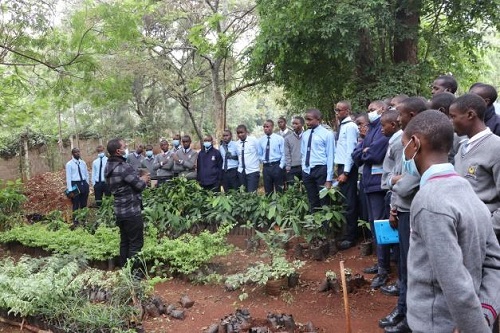
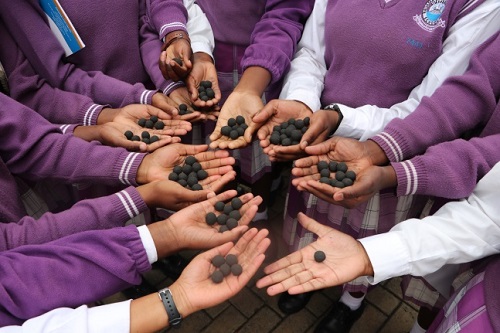
To reduce the effects of climate change, the Government has launched the national tree-growing restoration campaign that aims to plant 15 billion trees across the country by 2032. Indeed His Excellency President has committed to ensuring 30% tree cover by 2032. CEMASTEA remains committed to contributing to these efforts through tree planting and growing in collaboration with schools.
Under the STEM, Innovations and ESD Programme, CEMASTEA has donated seed balls and tree seedlings to visiting schools. From July to September, more than 300 hundred learners and teachers from Good Testimony International Schools, Upper Matasyia Primary, St. Bakhita Primary School and Masavi High School received tree seedlings for planting back at their schools. Karen C Secondary School and the OLC Mugoiri Girls received tree seedlings and seed balls during STEM Outreach activities.
During the school visits at CEMASTEA, learners tour the tree nursery, vegetable gardens and wastewater treatment plants, where they learn about sustainable development. They learn about biodiversity, sustainable production and consumption, and climate change's effects. The objective is to teach the value of responsibility and care for the environment through sustainable exploitation, production, and consumption. The Centre looks forward to engaging more schools in the coming quarter and continuing with national efforts to ensure a greener future. Kindly give us your feedback using the link https://forms.gle/S2DPjwEBRNrdL4bt7
By MKizito and MMungai
Kenya continues to maintain its place as one of the hotbeds for digital innovation on the continent. The government of Kenya has been keen on the roll out of the implementation of the computer coding curriculum in middle school and Junior Secondary under the Digital Literacy Programme.
What is coding?
Computer coding is the use of computer programming languages to give computers and machines a set of instructions on what actions to perform. It’s how humans communicate with machines. It’s what allows us to create computer software like programmes, operating systems, and mobile applications.
This new initiative reflects an ambition to re-imagine education and a solid dedication to building the future. And as it seems both the private and public sectors are aligned with this vision. Just this year alone, Microsoft, Visa, and Google have opened their first development centers in the country’s capital.
Learning to code has vital benefits in the current age. It’s a skill that is highly valued in the workforce and jobs related to computer programming are growing exponentially. Beyond the computer, coding teaches critical thinking, problem-solving, creativity and resilience. Coding is an essential skill in the future because it is an important part of the digital transformation.
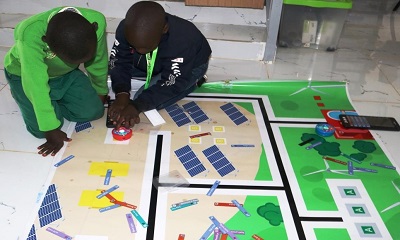
Students engaging in coding activities in the CEMASTEA Maker Space
What CEMASTEA is doing to promote and support Coding
Preparation of quality coding materials in line with the Curriculum designs that are easy to use by the learner and the teacher using ‘the from easy to complex approach’. Towards this end, CEMASTEA staff have written a coding workbook for Grade 4, 5 & 6
- Training and supporting teachers in equipping them with requisite knowledge and skills in coding in order to engage, expose and enrich the learners
- Conducting Boot Camps that are periodically placed as part of the Corporate Social Responsibility to learners from selected schools. The learners are given intense training on areas such as; Creative coding, Mobile app development, 3-D printing, Robotics, Arduino proto-typing among others during these boot camps.
- Active participation in coding events within the ECO-system, such as Rusinga school Hackerthon event
- The research and development (R &D) department has been spearheading a research on Coding uptake in Middle school and junior secondary
The number of jobs that require coding skills will grow exponentially because most services and products are being digitised. It means they will work on a virtual environment, and without coding skills, it would be hard to achieve this.
The Relevance of coding in the school curriculum is hoped to enhance students’ technological skills and put them on the scope in the ever-growing world of technology. The promotion of coding, which is a signature subject in the study of computer science and the digital world, students who learn and understand coding have an advantage of becoming full participants – rather than merely spectating – in a heavily computerised and digitised world.
The approval by the government to include coding in the Competency Based Curriculum, where Coding is a STRAND in the curriculum design gives CEMASTEA an impetus to support coding as part of STEM education through development of materials for training and supporting teachers in coding.
What is the future?
In recognition to the immense opportunities in coding, CEMASTEA has taken keen note on continued partnership with various stakeholders within the coding eco-system such as:
EduTech; Impact STEM Centre; Angaza Elimu among others.
Further, as a way of providing a platform for growth in coding, Internet of Things (IoT), Data analytics among other emerging 21st digital skill, the possibility of establishing incubation hubs where coders are given exposure, enrichment of their knowledge and skills to eventually expert - ready to work experts.
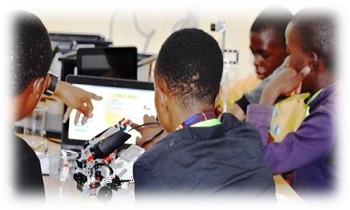
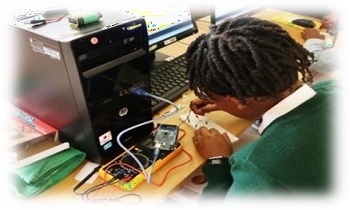
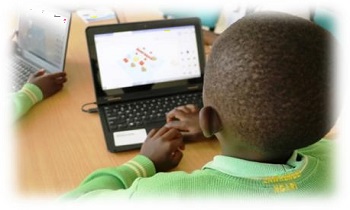
Students engaging in coding activities during the Coding Camp at the CEMASTEA
By: Mary Sichangi
CEMASTEA as the Continental Secretariat of the Association for Development of Education in Africa’s (ADEA) Inter-Country Quality Node on Mathematics and Science Education (ICQN-MSE) participated in the workshop on “Educating the Educators Initiative of the Energy Transition Education Network (ETEN)”
The workshop was held from 5th to 6th July, 2022 in the United Arab Emirates under the objective of bringing together international partners and stakeholders from the renewable energy sector to explore possibilities of working together in areas such as development and dissemination of teaching resources and raising awareness on the need to enhance renewable energy education with national curricula. The workshop was organized by the International Renewable Energy Agency (IRENA) drew participants from; UNICEF-Paris, OECD, University of Colorado Boulder – USA, Ministry of Education – UAE, UNEP-India, SDG 7 Youth Constituency and Global Council, UNESCO-Bangkok, IEEE, Teach for Zimbabwe, Teach for Lebanon, and Teach for All.
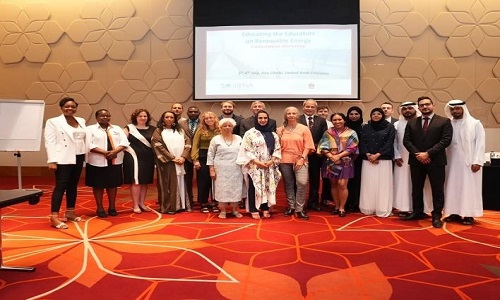
A group photo of the participants held from 5th to 6th July, 2022 in the United Arab Emirates
In her opening remarks, Dr. Nawal Al Hosany, Permanent Representative of the UAE to IRENA reiterated the importance of integrating renewable energy in educational systems transition. She urged participants to consider institutionalizing RE into education with focus on achieving: sustainable communities empowered and motivated youth, holistic view by educators on the reality we face of the energy crisis & creation of jobs in energy sector. The deliberations revealed lack of policy and sustainability curriculum framework for global adaptation by countries. The need for a framework to guide on priority STEM skills, learning outcomes, content and dissemination to the global audiences
A review study on curriculum frameworks for 100 countries revealed 47% of countries whose frame do not mention the term climate change. Majority of teachers believe that it is important to teach about climate change, but only 40% were confident and 20% can explain how to take action on the related impact. In conclusion, there is also need to mainstream the UNESCO’s greening education flagship projects in Renewable Energy (RE) in education policies, curriculum, teacher training and in educational institutions.
By: Thuo Karanja
TEACHING SCIENCE offers children a lot of knowledge and information that helps them understand how and why things work as they do. Science can explain the mechanics, processes and reasons behind the daily functioning of the many things that fascinate children. Such include toys, cars, their bodies, aeroplanes, phones, radios, and many other complex systems. Science helps to provide physical or visible evidence of many facts children encounter, read about in books and on the internet or see on the television; this helps to increase understanding and helps them to retain that information.
A strong foundation in scientific knowledge and methodologies can teach children essential skills like thinking clearly and logically, possessing an open and inquiring mind, and problem-solving skills and help them solve simple and practical problems.
It can also help them develop physical skills, especially in handling things. Children can also use this knowledge to understand new concepts, make well-informed decisions, and pursue new interests.
Science is the application of human intelligence to figuring out how the world works. Through science, man has discovered many valuable things that have made life much easier. Such include technologies for transport, farming, communication and building and medicines and drugs for many diseases. However, science such as nuclear warfare and uncontrolled industrial development that leads to overexploitation of natural resources and pollution continues to harm and worry human beings.
Science education in the 21st Century should prepare children for the future: confident, self-directed learners, concerned citizens, and active contributors able to thrive in and contribute to a world which is constantly changing. Science education should not just involve teaching learners basic concepts and facts of science. It should also equip them with other skills, including ethics and attitudes, to use that scientific knowledge and be aware of how science influences their lives and shapes their environments. Science education should therefore take a prominent place in any curriculum.
Children at different stages have different abilities, and their thinking develops as they grow. Children are curious about things from birth. Indeed curiosity does not need to be taught. An infant can hold objects, follow moving objects with their eyes, trace the source of a sound, and discover the relationship between their mother's breast and feeding; to feed; they have to suckle.
This learning goes on in stages such that by the time a child is ready for school, they already have a great deal of rudimentary scientific knowledge to recognise properties and characteristics such as size, colour, and even group (classify) objects. At higher levels, they are capable of more complex scientific skills.
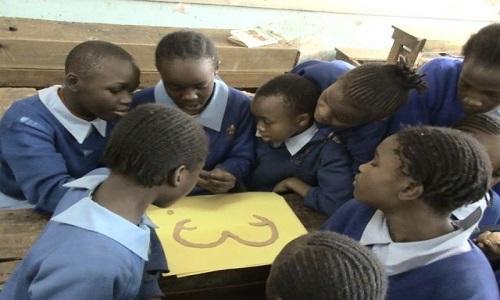
LEARNERS ENGAGED IN A SCIENCE ACTIVITY
Science is a 'doing subject', and children like ‘doing’ things. Taught well, most children find science extraordinarily inspiring and exciting. Children should enjoy ‘doing’ science. Well-planned science lessons enable learners to develop understanding and form questions based on their knowledge and the insight they wish to gain in the future.
Teachers of science need to realise that learners, through their formal and informal interaction with the natural and the design world, children already have developed ideas about most phenomena they learn in school. They already have explanations (sometimes misconceptions) for many objects, events and organisms in their immediate world. However, while most of these conceptions are scientifically inadequate, they influence the formation [learning] of new and proper scientific concepts.
Science lessons should be planned with activities that allow learners to do things, talk, discuss, ask and answer questions. Such activities are expected to be in line with the curriculum, not 'activities for activities' sake and can assist learners in clearly linking and understanding concepts being learned. Indeed, learners who excel in science lessons will likely develop a strong ability to think critically.

